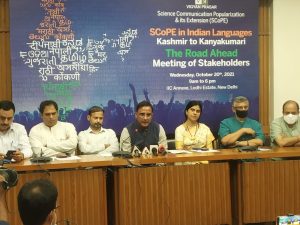
Vigyan Bhasha project takes science communication to the public

Schooling in the mother tongue is vital for grasping knowledge related to science and technology. However, in a world of rapid development of science and technology research, school education alone is not adequate. It can get outdated very fast. Informal learning spaces such as science clubs, popular science books, science news in newspapers, social media messages provide opportunities for nurturing a learning society.
Vigyan Prasar has been working to kindle interest in science among the masses using all physical and multimedia touchpoints. Public response for Vigyan Prasar’s efforts to promote science communication through regional languages has always been immense and is likely to grow further.
Going forward, Vigyan Prasar plans to reach every district headquarters with field-level activities. Taking the baton forward would be the numerous volunteers from various government, non-government, media, and educational institutes who have come forward to assist these initiatives in various states and UTs.
Also read: Scientists develop biodegradable polymer for packaging industry
Vigyan Prasar (VP) organized a day-long workshop to review and further plan its flagship project called Science Communication, Popularisation and Extension (SCoPE)-in-Indian Languages (also known as Vigyan Bhasha) at the India International Centre, New Delhi, on October 20 (Wednesday). Participants from all over the country working in various languages under the project joined the meeting.

Besides Hindi & English, 50 SCoPE experts/representatives from Urdu, Kashmiri, Dogri, Punjabi, Gujarati, Marathi, Kannada, Tamil, Telugu, Bengali, Assamese, Maithili & Nepali attended it. Eminent science Communicators from different parts of the country also came forward to plan actionable items going forward and reviewed the work done so far. These included representatives from universities, science and technology centers, and state S&T departments from across the country.
Also read: Here’s what Nobel prize winners for Physics did to deserve the honour
“To ensure quick and effective implementation of Science Communication & Popularisation at all levels in the society, connecting through one’s own language is the first step. This is why we chose all media products to be designed & developed in Indian languages,” said Dr Nakul Parashar, Director of Vigyan Prasar and brain behind the project.
He noted that challenges are many but with effective processes and a devoted team of science communicators, the project has achieved numerous milestones in a very short period.
Dr. T.V. Venkateswaran, Scientist and the National Coordinator for the project, said, “Vigyan Bhasha would mobilise various agencies, both governmental and nongovernmental to create a national effort to develop materials in Indian languages.”
Vigyan Prasar has chosen Kashmiri, Dogri, Urdu, Punjabi, Gujarati, Marathi, Kannada, Tamil, Telugu, Bengali, Assamese, Nepali, Maithili besides Hindi and English in its first phase of enhancing its science outreach programmes.
From monthly popular science magazines to regular lectures on the latest development and cutting edge research; from the publication of popular science books to harnessing social media to capture the imagination of youth; from producing television programmes to the latest science news, the Project Vigyan Bhasha initiative has unleashed the science communication, popularisation and extension in chosen Indian languages in the past two years.
One of the successful and massive efforts under the project was the celebration of ‘Ramanujan Yatra’ — a nationwide popularisation effort to communicate the strife, struggle and glorious achievement of mathematician Ramanujan — and the same time address the maths phobia by presenting various facets of advanced mathematics in a way that is appealing and intelligible.
Also read: Study finds high level of pharma contaminants in Cauvery
Sensitising and training media people towards science communication helps position science news and popular science in print and television. With this aim, capacity building programmes were conducted for media and journalism students as well as working journalists on how to communicate science to the general public. These skill development programmes have attracted wide appreciation and demand.
Publication of popular science books in Indian languages on advanced topics has already commenced modestly. Soon, VP would bring out publications in various Indian languages and make an effort to disseminate the publications through book fairs, melas, and regular sales through booksellers, including online sales.
In the years to come, the activities would be expanded into other languages, including tribal dialects in phase II. Together with resources persons and local support in the respective districts, Vigyan Prasar is poised to become a torchbearer of science popularization under the umbrella of the Project Vigyan Bhasha initiative.

